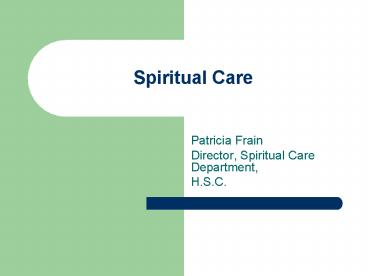Spiritual Care - PowerPoint PPT Presentation
1 / 12
Title:
Spiritual Care
Description:
What gives us meaning when all else is stripped away; the essence of life. May be ... When patient or family wants a specific ritual, ceremony or sacrament ... – PowerPoint PPT presentation
Number of Views:544
Avg rating:3.0/5.0
Title: Spiritual Care
1
Spiritual Care
- Patricia Frain
- Director, Spiritual Care Department,
- H.S.C.
2
What is Spirituality?
- What gives us meaning when all else is stripped
away the essence of life - May be expressed through poetry, music, nature,
etc. - Provides a sense of connection with all humanity
3
Spiritual Well-being
- The personal expressions of connectedness with
self, others, higher power, all of life, nature,
and the universe that transcend and empower the
self (Johnson, Maas, Moorhead, 2000).
4
Religion
- An organized system of beliefs shared by a
community of faith - Incorporates belief in God or some supernatural
power - Religion is different from spirituality
- Religion is just one aspect of spirituality
5
When to Call
- When patient or family requests
- When patient or struggling with diagnosis,
depression, grief issues, loss, guilt, anxiety,
searching for meaning, hope, purpose - When patient or family wants a specific ritual,
ceremony or sacrament - When patient or family wants to be heard someone
to listen
6
When to Call
- When patient or family has questions/doubts about
faith/beliefs - When patient or family wondering what they did
wrong to get sick - If you notice religious artifacts such as prayer
beads at bedside, ask person if they would like
you to contact hospital spiritual care staff or
their own community clergy
7
Impact of Illness on Faith
- Sick people often pray more
- Illness challenges ones faith and usual
expression of spirituality - Raises questions about meaning of life
- Inability to pray may create anxiety
- If a patient has hope, it makes a difference
8
Beliefs that Hinder Coping or Healing
- Illness as punishment
- Illness as my fault
- Belief that truly balanced spiritual people
dont get sick
9
there is a spiritual quality to how a person
perceives pain, finds meaning in pain and is able
to transcend the suffering caused by pain. I
would also suggest that most of our medical
solutions attempting to ameliorate suffering (at
least in acute care hospitals) focus on
externally driven treatment solutions that give
little consideration to the constitution of the
human psyche. This factor plays a significant
role in the quality of suffering experienced by
an individual. If indeed our duty as caregivers
is to reduce suffering where we can find it, then
we cannot ignored the spiritual factors related
to suffering. Philip Behman, Coordinator of
Spiritual Care, Alberta Childrens Hospital
10
Suggestions for Developing Focused, Compassionate
Nursing Care
- Take a breath at the threshold of a patients
room knock before entering - Listen twice as long as you speak
- Choose words carefully and pay attention to your
non-verbal communication /facial expressions - Look person in the eyes when addressing him or
her - When possible, sit next to rather than stand over
the person - Use gentle touch on hand or shoulder as
appropriate
11
Qualities of a Memorable Nurse Beyond Technical
Competence
- Caring
- Compassion
- Sensitivity
- Kindness
- Taking time to listen
- A loving presence
- Making their loved one happy
12
Questions to ask yourselfWhat are your own
- Values/ beliefs that influence your choices
- Longings or desires in life
- Sense of connection/belonging
- What makes life meaningful?
- What sustains you or gives you hope?
- Who do you turn to for support?
- What makes life worth living?































